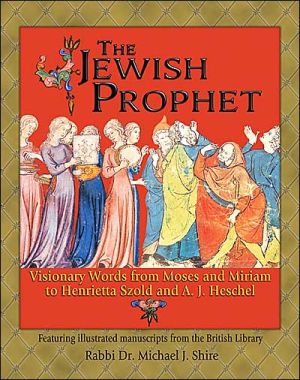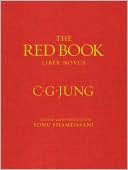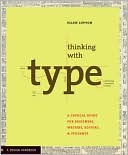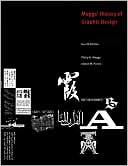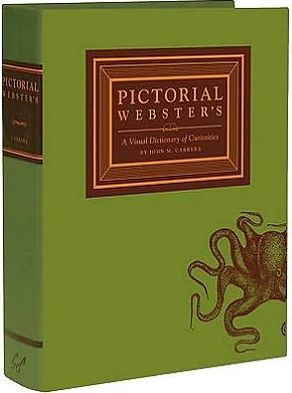The Jewish Prophet: Visionary Words From Moses and Miriam to Henrietta Szold and A.J. Heschel
"This illustrated collection of Jewish prophecy features the lives and teachings of thirty men and women. Throughout the ages, they bravely stood up to speak God's message and made a lasting contribution to our understanding of both the human and the Divine. This book also provides an inspiring and informative description of the role each played in their own time - and an explanation of why we should know about them in our time." "These inspiring moral and spiritual leaders were critics of...
Search in google:
"This illustrated collection of Jewish prophecy features the lives and teachings of thirty men and women. Throughout the ages, they bravely stood up to speak God's message and made a lasting contribution to our understanding of both the human and the Divine. This book also provides an inspiring and informative description of the role each played in their own time - and an explanation of why we should know about them in our time." "These inspiring moral and spiritual leaders were critics of the evils of society, rooted out corruption among those in power and provided healing and comfort in times of despair and hardship. They ranged from the biblical prophets through the thinkers and leaders of medieval times to modern-day visionaries and activists." "All of these people spoke up bravely against the evils of their day, and were prepared to risk their lives for the sake of truth. The lives and words of these passionate advocates for change are still a source of great inspiration today. Rabbi Dr. Michael Shire introduces their own words by discussing the life and message of each prophet, revealing how much Judaism has contributed to society's moral values. Drawing parallels between the biblical and later prophets, he highlights our ongoing need for men and women to take on the role of the prophet." Illustrated with illuminations from medieval Hebrew manuscripts, The Jewish Prophet is a richly decorated and fascinating collection of inspiration and wisdom; and the only book to gather together prophecy from ancient medieval and modern times.Publishers WeeklyA London-based rabbi, Shire is vice-principal of the Leo Baeck College and Center for Jewish Education. In this beautifully illustrated book, he selects 30 individuals who meet his criteria for being called "prophets," which he defines as "men and women who believed they were called to a special task in speaking God's word, and who served as the moral and spiritual leaders of their time." This differs from the conventional perception of a prophet as one who foresees the future, but it is consistent with the 21 books of the Bible that deal with prophets and use the Hebrew word for prophet, navi, meaning "spokesperson for God." For the first of his three categories of prophets, "In the Beginning," Shire adds Moses, Miriam, Hillel, Yohanan ben Zakkai and Akiva to the list of more familiar prophets such Samuel, Amos, Hosea, Isaiah, Micah and Jeremiah. His second category is called "From Generation to Generation," and Shire concludes with "Even in Our Own Time." This last section starts with Theodor Herzl and ends with Abraham Joshua Heschel. Most of the individuals designated by Shire are well-known, but he also includes less familiar names such as Lily Montagu and Hannah Werbermacher. The effort to expand the meaning of "prophet" may cause some raised eyebrows, but Shire builds a strong case for including people who are not in the Bible. Uniform treatment is accorded to each of Shire's "prophets," consisting of quotes, a brief biography and, in many instances, appropriate color illustrations taken from illuminated manuscripts in the British Museum. (Apr.) Copyright 2001 Cahners Business Information.
Chapter One \ \ \ In the Beginning\ \ \ In the beginning, prophecy developed as an expression of the Hebrew spirit. It was born in, and preserved by, Israel and has burned steadily to illuminate humanity's path to redemption. Each week in synagogue, portions from the second section of the Hebrew Bible, the Prophets, are read as an additional scriptural reading, the Haftarah. The biblical prophets, from Moses to Samuel to the fifteen literary prophets, produced some of humanity's most sublime ethical treatises, spanning nine hundred years in an age of great turmoil and uncertainty during the rise and collapse of the Near Eastern empires. The first Jewish Commonwealth was established and fell in this time. Yohanan ben Zakkai and Akiva witnessed the second destruction of God's Temple and recurring, exile from their Promised Land.\ The prophets provided a voice of both warning, and comfort to an embattled and dispirited people, encouraging them to trust in the destiny of moral rectitude and faithful commitment to God's Covenant with the Jewish people. They encountered the ridicule and persecution of those who despised change, particularly those who held power. However, God's word prevailed, sometimes predicting the future, but mostly warning and cajoling the people to listen to God and to the good in themselves.\ \ \ It is too light a thing that you should be my servant to raise up the tribes of Jacob and to restore the offspring of Israel. I will give you for a light unto the nations that my salvation may be unto the end of the earth. (Isaiah 49:6)\ \ \ MOSES\ FOUNDER OF THE MORAL LAW\ \ THIRTEENTH CENTURY BCE, SINAI\ \ \ I have put before you life and death, blessing and curse. Choose life, so that you and your offspring may live. Love the Eternal one your God by heeding God's call and being faithful to God.\ (Deuteronomy 30:19-20)\ \ \ The story of the prophets begins in the thirteenth century BCE with Moses, the greatest of them all. Called by God to take on the seemingly impossible task of delivering the Hebrew people from Egyptian slavery, the Bible relates that this giant of history was initially reluctant to tread such a dangerous and radical path. Like those who came after him, Moses neither sought his prophetic role nor, was he democratically elected to it by the people. It was by sheer force of the message he delivered that — in the face of vilification, threats and sometimes mortal danger — he succeeded in bringing together a disparate people to a distant mountain in the wilderness, and there enunciated the laws that were to underlie the teachings of all the prophets that followed.\ As the adopted son of Pharaoh's daughter, Moses was raised apart from his own people. Powerless to intervene, he watched from the royal palaces as his fellow Hebrews suffered under the yoke of their Egyptian oppressors. His sense of injustice was irreversibly awakened, however, when as a young man he witnessed an Egyptian taskmaster viciously beating a Hebrew slave. Moses killed the Egyptian and fled to Midian (mainly in northwest Arabia) where he married Zipporah, daughter of the local priest, Jethro, and settled into life as a shepherd. Moses vision of God at the burning bush in Midian marks the beginning of his time as prophet, prompting his return to Egypt to plead with the Pharaoh for his people's freedom. Ultimately successful, he led the Israelites out of Egypt across the Red Sea (c. 1250 BCE), and the wanderers began their long journey through the wilderness towards the Promised Land. At Mount Sinai, where Moses stayed for forty days, he received the Ten Commandments. He taught these and other laws to the people, thereby establishing the norms of Western civilization as we know it today.\ Each of the biblical prophets was passionately driven to fulfil their divine task, but each was also mortal, with human failings and weaknesses. Moses fell short in God's eyes as he became exasperated with the people's stubbornness and sometimes lost faith in the mission he was called to serve. Yet, more than any who came after him, he was privileged in his intimate relationship with God: the Talmud (Yevamot 49b) remarks that while the other prophets saw God through a dim glass, Moses saw through a clear one. He served as an intermediary between God and the people until his death just outside the borders of the Promised Land, and is for ever remembered as a faithful servant of God and the founder of the moral law.\ \ \ CALL TO PROPHECY\ Now Moses, tending the flock of his father-in-law Jethro, the priest of Midian, drove the flock into the wilderness, and came to Horeb, the mountain of God. An angel of God appeared to him in a blazing fire out of a bush. He gazed, and there was a bush all aflame, yet the bush was not consumed.\ Moses said, 'I must turn aside to look at this marvellous sight; why doesn't the bush burn up?' When God saw that he had turned aside to look, God called him out of the bush: 'Moses! Moses!' He answered, 'Here I am.' And God continued, 'Now the cry of the Israelites has reached me; moreover, I have seen how the Egyptians oppress them. Come, therefore, I will send you to Pharaoh, and you shall free my people, the Israelites, from Egypt.' But Moses said to God, 'Who am I that I should go to Pharaoh and free the Israelites from Egypt?' And God said, 'I will be with you; that shall be your sign that it was I who sent you. And when you have freed the people from Egypt, you shall worship God at this mountain.'\ (Exodus 3:1-4, 9-12)\ \ \ CREDENTIALS FOR LEADERSHIP\ Once, when Moses was keeping Jethro's flock in the wilderness, a little kid escaped from him. When it reached a shady place, a pool of water appeared before it and it stopped to drink. When Moses caught up with it, he said, 'I did not know that you ran away because you were thirsty, you must be weary.' So he put the kid on his shoulder and carried it back. Then God said: 'Because you have shown compassion to the flock of a human owner, you shall most surely lead my flock, the people of Israel.'\ (Midrash Exodus Rabbah 2:2)\ \ \ TEN LIFE PRINCIPLES\ God spoke all these words saying: I, the Eternal am your God who brought you out of the land of Egypt, the house of bondage: You shall have no other gods beside me. You shall not make for yourself a sculptured image or any likeness of what is in the heavens above or on the earth below or in the waters under the earth. You shall not bow down to them or serve them. You shall not swear falsely by the name of the Eternal your God for God will not clear one who swears falsely by God's name. Remember the Sabbath day and keep it holy. Six days you shall labour and do all your work, but the seventh day is a Sabbath of the Eternal your God. Honour your father and your mother that you may long endure on the land that the Eternal your God is giving you. You shall not murder. You shall not commit adultery. You shall not steal. You shall not bear false witness against your neighbour. You shall not covet anything that is your neighbour's.\ (Exodus 20:1-14, ABRIDGED)\ \ \ GOD'S LAW\ And now O Israel, what does the Eternal your God demand of you? Only this, to revere the Eternal your God, to walk only in God's paths, to love God and to serve the Eternal your God with all your heart and soul, Keeping God's commandments and laws which I enjoin upon you today for your good. For the Eternal God is God supreme, the great, the mighty and the awesome God who shows no favour and takes no bribe, But upholds the cause of the orphan and the widow and befriends the stranger providing him with food and clothing. You too must befriend the stranger, for you were strangers in the land of Egypt.\ (Deuteronomy 10:12-13, 17-19)\ \ \ Excerpted from The Jewish Prophet by Rabbi Dr. Michael J. Shire. Copyright © 2001 by Frances Lincoln Limited. Excerpted by permission. All rights reserved. No part of this excerpt may be reproduced or reprinted without permission in writing from the publisher. \ \ \ \
\ Publishers WeeklyA London-based rabbi, Shire is vice-principal of the Leo Baeck College and Center for Jewish Education. In this beautifully illustrated book, he selects 30 individuals who meet his criteria for being called "prophets," which he defines as "men and women who believed they were called to a special task in speaking God's word, and who served as the moral and spiritual leaders of their time." This differs from the conventional perception of a prophet as one who foresees the future, but it is consistent with the 21 books of the Bible that deal with prophets and use the Hebrew word for prophet, navi, meaning "spokesperson for God." For the first of his three categories of prophets, "In the Beginning," Shire adds Moses, Miriam, Hillel, Yohanan ben Zakkai and Akiva to the list of more familiar prophets such Samuel, Amos, Hosea, Isaiah, Micah and Jeremiah. His second category is called "From Generation to Generation," and Shire concludes with "Even in Our Own Time." This last section starts with Theodor Herzl and ends with Abraham Joshua Heschel. Most of the individuals designated by Shire are well-known, but he also includes less familiar names such as Lily Montagu and Hannah Werbermacher. The effort to expand the meaning of "prophet" may cause some raised eyebrows, but Shire builds a strong case for including people who are not in the Bible. Uniform treatment is accorded to each of Shire's "prophets," consisting of quotes, a brief biography and, in many instances, appropriate color illustrations taken from illuminated manuscripts in the British Museum. (Apr.) Copyright 2001 Cahners Business Information.\ \ \ \ \ Library JournalShire, vice principal of the Leo Baeck College-Centre for Jewish Education in London, presents a tasteful and far-reaching minianthology of Jewish writings that can rightly be called prophetic. Represented are 30 men and women, from biblical heavies like Moses to nonbiblical figures like Jewish youth work pioneer Lily Montagu. While Shire's introductions and selections are carefully written and chosen, the great virtue of the book is its illustrations 123 from illuminated medieval Hebrew manuscripts in the British Library. This is a gift-book or a smaller (61/2" x 81/2") coffee-table book but of a rather high-minded and delicious kind. Highly recommended. Copyright 2002 Cahners Business Information.\ \
